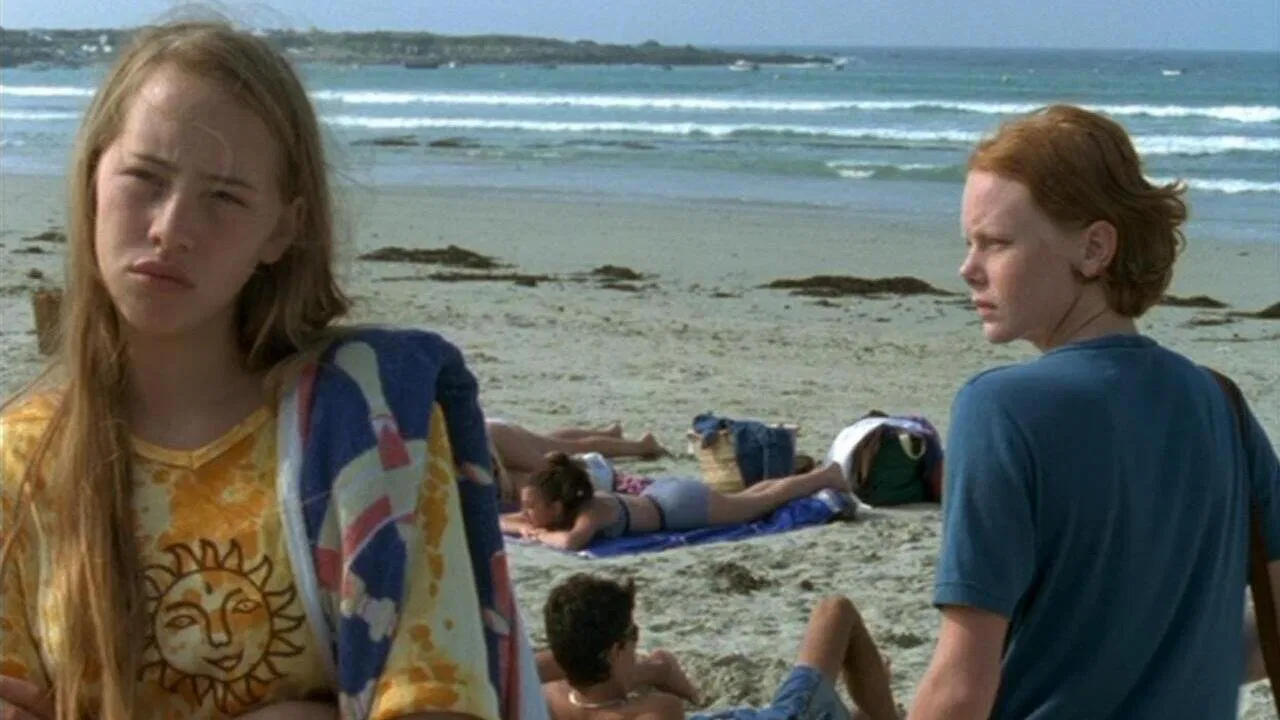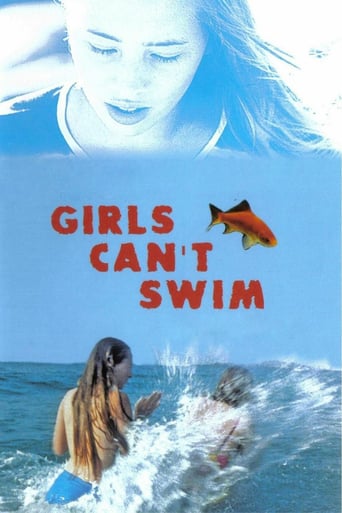Platicsco
Good story, Not enough for a whole film
Solidrariol
Am I Missing Something?
Lidia Draper
Great example of an old-fashioned, pure-at-heart escapist event movie that doesn't pretend to be anything that it's not and has boat loads of fun being its own ludicrous self.
kenjha
Two French girlfriends await their annual get-together at the start of summer vacation. The film is constructed in three parts. It starts with the story of Gwen, a flirtatious and perky blonde. The focus then shifts to Lise, a dark-haired and depressed teen who has just lost her father. The two friends come together in the final part. It's not clear what the point of this movie is. There isn't much of a plot. As the two girls undergo mostly mundane experiences, it makes for rather uninteresting viewing. Something out of the ordinary does happen towards the end, but it is so bizarre that it seems to have been added just to have a big finish.
noralee
"Girls Can't Swim (Les filles ne savent pas nager)" gets a lot right about teens, in a debut by writer/director Anne-Sophie Birot: The endless summer feeling of life Down the Shore (only here the Shore is at Brittany so there's no Bruce Springsteen music, let alone any beach music). The implied class tensions between townies and seasonals. The restless rebellion of adolescence, particularly as bursting sensuality.The casual back-and-forth between parents and teens as the kids alternate between neediness and independence, complicated by the parents' own financial and relationship problems.And most particularly the exaggerated passions of teen girl friendship. But the aimlessness of summer vacation is mimicked too much in the pacing, with an abrupt culmination that's not fair to the characters. I must have missed the explanation for the title. Clearly Eric Rohmer's "Pauline on the Beach" has haunted today's French women filmmakers as this is the second such movie I've seen in a year that feels like an angry response to that sage putting a teen girl amidst adult sharks, after "Fat Girl (a ma soeur)."(originally written 5/11/2002)
dbdumonteil
In the end of the twentieth Century, the teenage movie came back into vogue in the landscape of the French cinema, this movie made by Anne-Sophie Birot confirms it and reveals her own approach in the content and form about the difficult condition of being a teenager.By dividing her movie in 3 chapters, by delaying the meeting between the 2 main characters, Anne Sophie Birot takes the viewer by surprise. In the first 2 parts, the female director takes her time to draw the portrait of her 2 young interprets and to place them in their respective family circles before making them meet. Their families don't belong to the same social level but are eventually similar on one point: they're on the verge of disintegration. First, Gwen whose family background is very modest. She is lovely and by embarking on overnight love affairs, she knows her first sexual excitements. It's for her the sole way to escape from a tense familial cocoon between a lazy and alcoholic father and a mother who does her best to make ends meet. Now about Lise, the big house in which she lives makes us deduce that she belongs to an upper-class category whose climate is hardly better than to Gwen's. The death of her father plunged her whole family in bitterness and sorrow. Her mother, especially seems to break into pieces. So, to escape this dreary universe, Lise, secretly goes by coach to meet her long-time friend...As soon as the two friends are together for the holidays, the movie seems to go on, at first in this dreamy perspective. But bit by bit, disagreement grows, the tension that reigned in the two families has overwhelmed the two friends. As a result, there's a detachment and a distance from Lise. Anne Sophie Birot proceeds by little touches and with subtlety to let suggest the reasons of this split. Very simply, Lise is jealous of Gwen's beauty. It is the time of first teenage loves. Gwen is pretty, slender and has no trouble seducing boys whereas Lise due to her little attractive physical appearance is completely eclipsed by her friend when it comes to seduction. So, rancor, jealousy even betrayal suffer into her which lead her to nearly separation with her all time confidant and the director isn't afraid to end her work with an abrupt ending which tips it out in blackness making the viewer feel unwell.Once again, here's a movie which has the merit to show that it is not an easy thing to be in one's teenage years. Furthermore, real love seems to be omitted from the work. For example, Gwen seems to have love affairs with several boys, but it's more a means to assert herself to go away from a ponderous household . And the female director is buoyed up by her two young interprets whose roles seem to fit them like a glove. For the rest, I will retain this irregularity. According to Gwen, Lise is a brilliant student but in the beginning of the film, we learn that she failed at her GCSE. She handed in a blank sheet of paper but we don't know much about what might have explained her behavior. It would have been wiser and more consistent to make her pass her exam so as to solidify her personality and to better prepare the sequel.
kranbot
My sister and I saw this film at the Music Box Theatre in Chicago. The film seemed to drag on forever without much forward motion. When it finally ended, the entire audience burst out laughing--a very odd response to a tragic narrative. I'm not really sure why everyone laughed--nervous tension, perhaps, since the film ends on a down-note. But, it was more than that. It seems that the pacing and the setting were so culturally removed from what most Americans are used to that the film seems almost absurd. Absurd is really not the right word--perhaps the film is just very difficult to identify with due to the overlong and tedious pacing and the utter lack of humorous moments to offset the downward spiral into sadness. I hate to mention cultural difference as being a reason to judge a film, but clearly some universal message was missing. Kieslowski's _Ten Commandments_ are examples of films that depict a very different culture from what some people in other countries might experience, but Kieslowski manages to instill a sense of humanity and timelessness to his work that _Girls Can't Swim_ cannot seem to muster. And from my perspective, the two girls simply weren't very compelling. One teenage girl explores sex, the other is depressed over her father's death and does things like see how long she can hold her breath under water. Ho hum. Both could have used a bit more character development. This isn't a bad film--just a very slow, humorless one.

